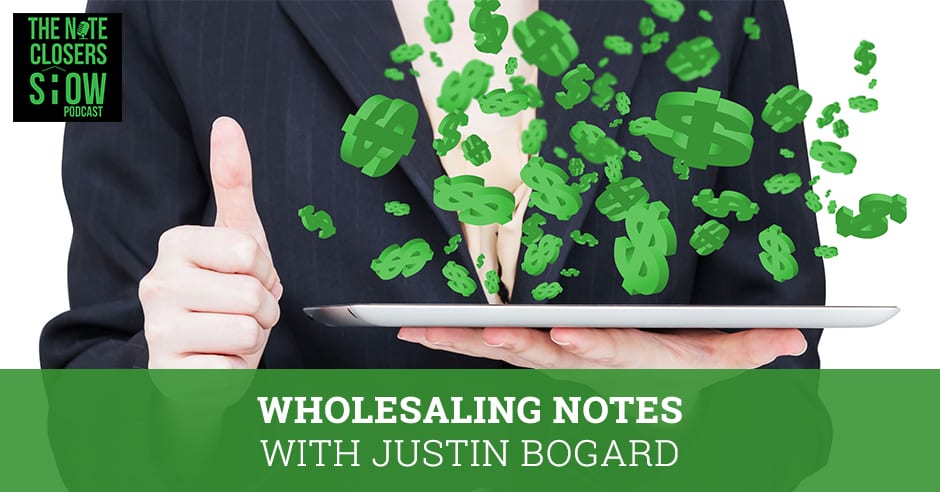
—
Listen to the podcast here
Wholesaling Notes with Justin Bogard
I’m excited to be here. You can get a lot of nuggets out of this show. We’re honored and jacked up to have somebody who’s doing a great job and awesome things out there. The man, the myth, the Indianapolis note wholesaling legend, Mr. Justin Bogard from BrightPath Notes. Welcome to the show.
Thank you very much, Mr. Carson.
For those that don’t know you, share a little about who you are, your background, how you get started in notes and we’ll go from there.
Back in 2004, I bought my first home. It was what we called a HUD Home. I was wanting to put some sweat equity into it. I found one that needed a new carpet, paint, appliances and some random patchwork here and there. I lived in it for a few years and then I end up selling it during the downtime, which was about ‘08 to ‘09. I was thinking about how everyone was telling me, “You probably shouldn’t sell the property right now because you’re not going to make any money.” What do I know? I had a realtor friend of mine who helped me stage the house and helped me understand how to sell the home and I learned a lot from him. I sold it within 24 hours because I basically did exactly what he told me to do. I staged it the way he wanted me to and I made about $3,000 on it, which was nice.
I get a bug for investing in real estate. I was like, “I sold this thing in a down market. I made some money on it.” Everyone else was telling me, “You don’t do that right now.” It’s like, “I did it and it works.” I went out. I did some more wholesaling deals and some fixed and flipping and also invested in myself and got some real estate education. I had some mentors and some coaches teach me the process. I spent some money on that. I had a full-time job at the time. I was a database analyst working for some print companies. I fired my boss and then I went on my own. I wholesaled some more deals, fixed and flipped, turn into some rentals, which I did like a whole lot and then notes came into my life.
There was a guy that came into town and did a presentation on note investing and buying mortgages in the second-hand market. I was like, “Why would I do that?” I listened to him. I saw his presentation and I saw his case studies and how he made money and I’m like, “This is great. No tenants, no toilets, no trash. I can be the bank. I own nothing but I control everything? This is for me.” I turned my real estate life around and said, “Let me liquidate all my flips. Let me figure out how to get things into notes and transition into notes.” I learned how to wholesale notes. I learned how to buy non-performing, performing notes. I’ve been networking a lot, meeting people like yourself, Scott. We met at the Note Summit. I put myself out there. I have my own Note Meetup now in Indianapolis that I do. I’m starting to do social media. I learned a lot from watching the We Close Notes podcast and listening to the marketing. It’s really about marketing. You don’t have to know everything about the business. You need to put yourself out there so that people know who to go to. That’s where I am now. You saw me speak at the Note Summit. I’ve been to some more events and been on a couple of podcasts now, a couple of radio shows. My head’s getting bigger and bigger.
You did a great job presenting at the Midwest Note Summit that Vena Jones-Cox put on there and it was great. Let’s talk about a couple things. I’m sure you’ve heard people get into this, “I can’t find any deals. It’s too overpriced,” and stuff like that. When you know how to market, you can find deals. Would you agree to that?

Wholesaling Notes: People get hung up on thinking that there is only one place to buy notes.
100% and there’s not one place to buy notes. That’s what people get hung up on especially being in the note business. There are a lot of people that are hung up on, “Where do you buy deals?” You show people where to buy from banks and then private seller category is essentially untapped. I’ll send out direct mail campaigns to people that own these seller-financed paper and buy it from them and those are really my best deals.
There are a lot of private sellers. Some people make a mistake of private sellers as the people who have done finance note one or two deals. There are also a ton of other investors like you and me that can be considered private seller aspect of things. You’re reaching out on a regular basis. Your basic business model is wholesaling notes, finding some deals and being the note matchmaker of some of the deals that you’ve got.
The note liaison, the debt dealer, however you want to describe it. My business model is simple, “Do I have the money to fund that deal, yes or no?” If I don’t, I’ve got a group of buyers and I’ve got a group of sellers that I market to and say, “Let’s connect everyone together,” and I’m not going to lose an opportunity if a deal comes across my desk and I make some money on it.
Let’s talk a little about that because wholesalers in the traditional fix and flip game have a bad rap. They see something and they have no idea what the ARV is or what the true value of the property is, what type of repairs or what type of exit strategies are available. They pull some numbers out of their ass and you look at the numbers and it doesn’t make sense for fix and flippers. With wholesale on the note side, it’s a little bit different ballgame. The biggest thing you talked about is networking and bringing people together. You do a good job of matching up the deals that you come across with your potential buyer base. What’s the big key to that for those who are looking to get to note business or wanting to start wholesaling? They don’t have a lot of their own capital. Some of them are wholesaling a piece of property, you find a deal, get it at a decent price, put it on a contract and then sell that contract for the most part. What’s the big thing about what you’re doing? I love your case studies because it’s all about knowing your list.
Going to Note Meetups, going to Note Summits, going to Note Expos, Note CAMP, whatever the case may be. Talk to other people. Find out what are they looking for. Ask them to be on your mail campaign. There are a lot of note buyers out there and you have to find the note sellers via hedge funds, private sellers, doing direct mail campaigns and that thing. You get the note buyers from networking. I make a list of people when I go to these events and put them all into MailChimp and start sending out blasts. If I have deals going on that I want to sell, they’re the first ones to get it. I have a segregated list within that are more of my high rollers, people that I know can fund deals quickly and then I’ve got my other lists. In general sense, it’s networking. It’s getting out there, bring yourself out there and say, “I’m a note buyer and I’m not a seller. If you’re looking for deals, if you’re looking for passive income, if you want some non-performing deals, come see me. Let me show you my inventory.” Start that way and it snowballs into, “Did you know Justin does notes? If you’re looking for some passive income.” I get referrals that way as well.
Let’s talk about qualifying your contacts because that’s one of the biggest things. I get people all the time, “I can sling some notes and it needs some funding.” I’m like, “Get out and start networking.” Start doing the same things you do to find buyers. Get out and start talking to people. How do you qualify or proof up your buyer so that they’re not leaving you hanging in the closing table and you lose space with the buyer or risk getting blacklisted?
I’m glad you brought that up because that was a big part of one of my case studies at the Note Summit was that to tell the honest truth about the business. You’ve got to check your buyer, make sure they have the money. Ask them for proof of funds. Make them sign some commitment. I have some investor commitment. I have people sign to say, “I’m pledging this amount of money with you. When you find the deal, I will fund it within 48 hours,” and there’s a penalty if they don’t fund it. It sounds harsh but once it happened to you at one time, you don’t want to happen it to you again.
In that case study that I was talking about, there were a couple of guys that I hadn’t met before and I hadn’t done a deal with them before. They were all serious about buying notes. At the last minute, they backed out for whatever reason they wanted to. I was able to escape the blacklist from my source that I was buying them from but at the same time, it was very nerve-wracking to go through that and not check them. Lesson learned is that I need to vet them more heavily so I would suggest to have an honest conversation with them and say, “What capital are you working with? Would you mind showing me proof of funds? Don’t take offense to it, you’ve got to understand that we need to know because these are real deals. This is a real situation, this is real money.”
It’s definitely important too when you’re putting a deal together. You’re not asking for a letter of intent, which a lot of brokers do. You’re only asking for proof of funds for basically the amount that they’re looking at purchasing. It’s a different thing than, “Give me a proof of funds and letter of intent before I even show you any assets.”
I get few people on LinkedIn that the assumption is a broker joker and they’ll do the same thing. They’re like, “Show me proof of funds and LOI before we show you the deal.” I’m like, “What? Give me a snippet of what you got and I can tell based on the discount if they’re going to be good for me.”
For your portfolio, are you primarily buying non-performing or performing or a mixed bag?

Wholesaling Notes: Cash flow not cash burn.
About 75% performing.
There’s nothing wrong with that. You like the cashflow.
Cashflow, not cash burn. I’ve got nothing against non-performing notes. I’m more comfortable with performing notes, to be honest.
You get cheap money coming in below with the ROI is on the performance side because it’s great with arbitrage.
I do a lot of that as well. It’s funny when you talk to investors and you tell them, “I can give you 6% interest only rate for a couple of years,” and they’re like, “You can do that?” I’m like, “Yes, I can. How much do you have? What would you like to spend?” We’re able to work some deals that way. There’s definitely room to make some money when you borrow some money cheaply and you can borrow it for a few years and they are comfortable with the security. They can take your place if you default on them and if they know you, like you and trust you, that’s the best way to build that relationship.
6% is cheap money. When you go networking like the Midwest Note Summit, you’re going to find sharks there that probably aren’t looking for a 6% return on their investment. Where are you finding people that are happy with 6%?
People from my Note Meetup and people from every walk of life that don’t really get into real estate. They’re maybe someone’s attorney or their doctor and they’re like, “I am so busy but I have this stack of cash I need to work. How can you help me?” That’s how it happens. It’s obviously not the real estate investor. It’s not somebody that’s looking to be in the real estate. It’s the person that’s busy in everyday life, that understands that they want their money to make money, but they don’t like where it’s at currently like in the stock market or with mutual funds or whatever it is they have it in because they’ve been brainwashed to thinking that’s the only way they can make money.
I grew up that way. I grew up like, “You’ve got to have a savings account.” I look back and I go, ‘”2% on a savings account, how does that make sense? What’s the inflation now, 2.5% to 3%?” You’re losing money. When you tell people that they can make 6% and do nothing, “Sign me up, it’s great.” It doesn’t happen every day every time you meet somebody. What the interview process is you learn what you are looking for a return and what’s going to make you happy. I tailor my conversation based on, “You fit in this program, no you fit in this program or you’re the partnering program and go down the list.”
As you said go down the list, knowing where that person falls and what their expectations are and then what you come across that can fit into that, it’s not putting round pegs in the square holes but finding the round hole for the round peg. If you’re looking at $25,000 that can make 6% money, that’s 6% of $25,000 in a year, not much. It’s $125 a month. You find a note that is paying out more than $125 a month, you’re going to pull your money out and get them to fund the deal and make the difference in between.
That’s what I love about borrowing some money cheaply especially when you don’t have to borrow it per asset when it’s more like a loose promissory note. That’s what I do in full disclosure. I’ll have loose promissory notes to my company and then I’m able to leverage that money and go out and buy some deals for myself as well so I can build my portfolio up.
Are you paying back on a monthly or quarterly basis or the end of the year? How are you structuring that with payouts for you?
I personally like to do quarterly because with monthly, I feel like it got too much of a time crunch when you’re in between deals and have post-closing issues and stuff. You may not get your money as soon as you buy it. It may take you 90 days to see your first payment. I like the quarterly aspect of it. I try not to do monthly but if somebody pushed me monthly to still borrow their money cheap, I’ll go ahead and do it.
Who’s going to turn down 4% to 6% money? I can make the payment out of that to get that money in-house. What would you say have been your biggest learning curve being a wholesaler?
The biggest learning curve is that I am not a salesperson. You have to learn how to be a salesperson very quickly in this business. It’s something I wasn’t comfortable with at first, but after you do a couple of deals and you make some money, make a few thousand or $10,000 or whatever, you’d be like, “I can be a salesperson.”
The fact is that you can learn how to be a sales guy, correct?
Yes, you can learn how to be a salesperson. I had to learn how to talk to people. If somebody is from Austin, Texas, I may have to talk a little differently. If somebody is from Minneapolis, Minnesota, I may have to talk to them differently. If they’re from the rural area or from the city, you have to tailor your conversations and pick up on little things that they talk about. Understand what their pain points are and then use this. Listen to them, understand what they want, be genuine. Getting education from other people in different marketing businesses on how to be a salesperson, that translates a lot because it’s all about the communication. It’s about getting them to know you, to like you and to trust you. That’s the biggest learning curve is learning how to be a salesperson. The deals are easy to run because everyone can run a calculator and can run a math and go, “What’s my tolerance? What’s their tolerance?” and play it from there.
How often are you mailing out to your database? Are you doing it on a regular basis or once in a blue moon or never?
My database where I’m trying to get buyers and sellers together or where I do my mail campaigns?
Let’s talk about both.

Wholesaling Notes: Being a wholesaler, the biggest learning curve is learning how to be a salesperson.
When I do direct mail campaigns, I figure out what state or what counties I want to concentrate in and I’ll mail that probably at least four times. I’ll try and do it over a 120-day period, about three or four months. In that way you get that repeat touch and when people call you and they want to be off your list or you have a note that’s presented in front of you. I don’t know how many notes you see like this but I see a lot of zero down notes lately from some of these areas. It’s going like, “I’ll price this note but it’s not going to look pretty.” There will be a lot of crap that you have to filter through.
With networking with buyers and sellers, I’m sending out my MailChimp campaigns at least once a month with my newsletter. I’ll send out deals every now and then when I get some good deals come across. The social media posts are the thing that I’m gearing towards pushing a lot more and doing some daily post or at least a weekly post at a minimum. I’m starting to do that a lot more to reach my network of buyers and sellers to keep them engaged and understand what I’m doing and what I’m looking at what deals come across. When I’m on We Close Notes podcast, that will be my next social media campaign.
It’s all about staying in front of your audience. We get bombarded with so many different inputs and things coming at us. It’s no wonder that most Americans have less than a nine-second attention span. The goldfish have nine seconds, we have often less than a nine-second attention span. Knock it out. Once a month, you are marketing out or doing some direct mail campaigns. You’re setting yourself up for success by planning it over 120 days. Many note investors send out one mail piece or one marketing piece and they expect it to be perfect and then they give up after that. Have you seen a lot of that?
Absolutely. Probably about nine out of ten people are doing that. It seems like with the people I talked to, I’m like, “You have to be consistent. You have to have multiple touches.” You’ve got to be in front of them. They’re not going to bite on the first one. They may remember your logo or your brand and realize they have gotten multiple letters or postcards from you. Eventually, you get those repeat phone calls. I still have people call me from a direct mail campaign I did back. It’s like, “I catch your mail piece,” and all of a sudden the pain gets turned up on them and they’re willing to sell their notes. They wanted to liquidate and get out of the situation.
If you’ve got a great marketing piece, people will hold on to it. We do a direct mail campaign out to traditional IRA investors or people who don’t have a self-directed. It’s funny when we get phone calls or email from people that got a postcard six months ago, “I’ve been watching some of your stuff. I’m ready to make my money work. I left my job, I’ve got a 401(k) I want to roll over now and do some fun stuff.” It’s all about staying in it, rinse and repeat and building a note pipeline or a funding pipeline. When you’re getting lists, do you get your lists from banks for your deals that you wholesaling off or are you getting those from private sellers? Are you getting those from banks or hedge funds as well?
I don’t have much luck with banks so I need to get some Scott Carson education on that, but hedge funds and private sellers are the main bulk of my inventory. Then surprisingly, word of mouth. I’m in a BNI Network locally here in Indianapolis and you’d be surprised how somebody’s property management companies are a great resource. They have landlords that they work with and property owners and then they’ll somehow either have a note that’s a different portfolio they have or somehow they have a note. I get a couple of non-performing notes that way too. which is strange but it works. It’s funny where you network, you’re able to find a source somewhere.
I’m glad you said that because networking is key. Many people show up to meet maybe once a month and they sit back and hide, cross their arms and not talk to anybody. You’ve you seen plenty of those people.
“I’m Mr. important. I want deals to come to me. I’m not doing any work.” Then you’re probably going to make 5% or 6%. You’ve got to do some work to make some dough. No work equals no returns.
Are you buying stuff in Indiana for your own portfolio or are you doing it across the country?
Across the country. Mainly in the Midwest and the Southern states is where I like to do it. I’m not familiar with some of the West Coast stuff and quite honestly, it’s too pricey for me. I’ve got to maintain my threshold of under $200,000 per asset. I’m not going North of that.
The biggest thing I tell people is if you start getting about $250,000 value assets, those people often have attorney friends, to help drag that foreclosure route if there need to be. Plus, if you buy a $250,000 asset, you can buy half a block in Indianapolis.
You can go to the city and get about 90 parcels that way.
Indianapolis has been going through quite a bit of growth in the last couple of years. Are you still seeing that there in Indianapolis?
Indianapolis has been growing and growing and they’re going to continue to grow. They’ve done an excellent job of beautifying Indianapolis. We don’t have large skyscrapers but we’re growing outward. We’re reaching different parts of Indianapolis and making them more beautiful. We’ve got an HDTV show called Good Bones that’s in Fountain Square, which is right outside of the downtown Indianapolis area. They’ve blown that area up and they’ve also blown up an area next to what they called Bates–Hendricks. You’ll see them go through some flips out there and that has pulled a bunch of real estate investors to hit that market. There are good pockets in Indy and there’s a ton of growth. There’s a potential for Amazon to be here as well. We look for those businesses to come here locally to Indianapolis and it really helps. A lot of the Millennials are downtown right now, which is nice too because they’re starting to understand. They’re looking at getting duplexes and living on one side and renting out the other. That’s nice to see they’re beautifying Indianapolis and a lot of good rehabs down here.
It’s good to see you’ve got some other major employers. Obviously, you talk about non-skyscrapers but you do have the RCA Dome.
That was many years ago, now it’s the Lucas Oil Stadium. We have the 500, we have the Brickyard that utilizes the speedway very well that brings in a ton of people. We have huge conventions, I want to say Comic-Con, I’m not sure if that’s the right name, but Gen Con and other ones that come to Indianapolis. They bring a lot of people. Airbnb does really well here. That’s what we’re seeing a lot right now.
That’s a good thing especially here where it’s certainly getting warm up a little bit across the country. The frozen tundra of Indianapolis is thawing out. Let’s bring in back a little bit here. You’re reaching out to your list, you are networking at local Meetup club, local BNI groups, networking locally but also at events. Make sure you get to know your list, find out what they’re focused on, what they’re looking for. You’re reaching out to investors and finding out what would they be happy with or what their money doing right now. On the investors that you’re getting the cheap money from, are you seeing it coming from my 401(k) or certificates of disappointment? Where are you seeing that money coming and roll it over from?

Wholesaling Notes: Networking is key.
I don’t see a lot of IRA money, surprisingly. I see a lot of people with liquid cash laying around that want to work it, which I thought would be the other way around when I got the note. Maybe it’s the market that I’m in and the circle of influence that I’m in, but I don’t see a lot of retirement money being used for this purpose. I explained to people that this is a great way to grow your retirement. That’s really what you should be using is to put that in there. I tell people I got my kid’s college account set up with a trust and I got my IRAs in there. I’m showing people I’m buying deals with this stuff. I’m not saying it.
When you’re closing on stuff, are you doing a double closing? Are you doing a faster close? Are you having the investor that is buying your assets or are you doing closing like a double close? How are you getting those things close? I’m sure people are curious about how that money exchange hands and gets from them to you and into the seller.
There are a couple different ways to do it. The way I prefer to do it is to hold the money in my escrow account. I then fund the deal through my entity and then write a new assignment and launch to the buyer. Then I keep the money that’s the difference between what they’re buying and what I sold it for. The way to do it with a hedge fund or an individual that I know well enough that I’ve done deals with and I’m comfortable, I’ll have my buyer fund them directly and then they’ll pay me a broker fee or wholesaler fee the difference. That’s the two ways that I really do it. I prefer the escrow way because it’s cleaner and it looks more professional like I own the asset. I call it the double closing but I don’t know what you call it.
It’s not truly double closing because it’s a wire transaction for the most part. People don’t realize that for the most part, it’s not like going to the title company and sitting down with tabletop closings. It’s basically about making sure the funds are there and the collaterals are there. The thing is really making a difference out there is I love this from your case studies. This is one of the biggest things that I love about your case studies. When you’re looking at the assets, you’re literally doing the due diligence even when you’re wholesaling, you’re doing the due diligence like you’re buying an asset though.
I want to be confident to know that I didn’t sell somebody something that’s going to turn out to be a turd. I don’t mind doing the due diligence. It’s not that hard. I’ve had them pay for it, but I’ll walk through it with them. Most of the time, I’m dealing with people that haven’t bought far many notes. If I’m selling a note to you, I wouldn’t have to worry about it because you know how to do that but most people I deal with don’t know how to do it. I underwrite a form and say I would buy this deal and this is why and if they don’t like it, they don’t like it. I don’t push them to do it. I’ll say, “I would buy this deal. If you don’t want to fund it, don’t worry about it. I’m going to figure out where to fund it because I like this deal.” I know what I’m putting in front of them is something I would buy and that’s what I explained to them. I would buy this deal because of this reason.
I love the name. How did you come up with the name BrightPath Notes?
I was married a few years back and my wife at the time was in marketing and branding and so she helped me create the name BrightPath. I had a family of entities like that. I liquidated most of them and now I have the BrightPath Notes. That’s how it happened. I wanted to say what it meant and now that I’m in the business, I find out that not a lot of people understand notes or really talking about it. I had to say mortgages because that’s what people correlate to understand what we’re doing. That’s how it’s created with the help of my ex-wife.
When you’re talking with your money partners and you started talking about mortgages, do they suddenly start flipping out thinking it is going to be a 30-year investment?
They do. That’s their first assumption. I let them think that so they can ask me those questions and I can shoot them down quickly and go, “No, you don’t have to be in this for 30 years. You can sell it whenever it is, just understand that you’ve got to sell it to somebody else for a discount because that’s how this business works. If we buy it correctly, there’s going to be enough spread in there after a few years when you take all the juice from the interest.” We’ll focus on probably frontend notes if that’s their intention is to probably sell it, so they have room to sell like a UPB discount hit. That’s a conversation you have and say, “Do you want to do a partial? I’ll buy the back fifteen if you buy the front fifteen? If your numbers work out for me, that’s what we’ll do.”
What return are you looking for your own investments?
I don’t focus too much on yield. I want to be north of ten. I typically land in the range of probably eleven to fourteen on performing notes. I focus on the discount and what the underlying asset is. I base heavily on pay history. If I see someone with ACH payments and it had a history of least fourteen to sixteen months like that, sign me up. Other people are hung up on yields, I’m hung up on pay history.

Wholesaling Notes: When you’re looking at the assets, you’re legally doing the due diligence with your wholesale.
If you’re using other people’s money from the transaction, you’d get a nice return on investment there that turns out to be pretty good especially arbitraging your funds or having them to fund the whole thing.
It’s all about having a consistent payment.
What’s the big tip you can give to people out there talking about new funding sources, about raising capital? Are there any mistakes that you’ve made that you’d like to tell people to avoid or any tricks of the trade?
I would say talk slow and keep it very simple and to the point. Don’t over analyze things because that was my problem having an engineering background and being very analytical. I was like, “This is awesome.” I was running through all these numbers and you see people’s eyes cross and going, “How do I get out of this meeting? I don’t know what this guy’s saying.” You’ve got to keep it simple. Basically, ask them a lot of questions and then they answer it for you. You say, “What’s your pain point? Why am I here talking to you now? What interests you about this?” Then gear your conversation towards that. It’s me being over analytical at first was a challenge. I’d definitely lost out a lot of potentials. That’s what my advice would be is to slow down and keep it simple. Don’t harp on the yields of returns, harp on the security of what you’re buying. You’re buying debt at a discount. The underlying collateral is worth way more than what you’re buying into it. It’s relatively one of the safer investments out there to make a high yield.
With a higher yield, often the better security we have too. It’s different than most places. A higher yield often equates to risk most of the time. That’s not always the case with the note business. One of the biggest tricks I learned early on from one of my great sales trainers back out of college, I was working for Verizon Wireless. I remember this guy, Benjamin Rodriguez, he used to tell me to mirror the people talking to because I get excited. I rattle off at a mile minute. It’s learning to mirror the people I’m talking to in a conversation. When they’re slow, be slow in your delivery. If they’re fast, be fast in your delivery but not faster than them.
Be respectful and be mindful and be genuine. It’s a lot to take in and you’re trying to think of the stuff in your head but start off being natural and what comes naturally to you. Talk to Scott Carson like he’s your friend. If you’re my buyer or my seller, I want to talk to you.
I couldn’t agree more and to keep it simple. You mentioned earlier over analyzing, you’re not showing them twelve different exit strategies. You’re probably showing them one or two strategies for the most part?
If they’re interested in non-performing notes, we go over the general three. Re-performer is the first way, the deed in lieu is the second way and foreclosure is the last way. I let them ask the question about foreclosure because I might go down a rabbit hole of, “You can turn that into a rental or you can turn that into a seller financing.” Let them ask you the question so that they feel like they’re controlling the meeting.
Let them feel they’re in control but you do their questions, how they’re taking the answers. You don’t want to diarrhea the mouth and throw up on them and also take a deep breath. One of the biggest things about sales is if you’re a potential funding partner, a potential buyer, if you’re desperate, they can sense that.

Wholesaling Notes: Everyone is going to be nervous the first time. It’s just human nature to be nervous when you’re doing something new.
Your first deal, you’re nervous and you’re sweating. You’re like, “Isn’t it hot in here?” They’re like, “No, it’s 30 degrees outside. What’s wrong with you?” You’re like, “I’ve got to change my shirt, can we do this another time?” The mechanics are simple. Everyone is going to be nervous their first time. It is what it is. It’s human nature to be nervous. You’re doing something new, something you are unfamiliar with but slow down, take a deep breath and talk to them like a person. Expect them to tell you no. Expect that so that you have fun with it and you learn with it and move on to the next person. Don’t get hung up on staying up late at night like, “Are they going to fund the deal? Are they interested or are they not?” Keep on blasting them with good content and do it in a respectful manner. Don’t overdo it, but don’t underdo it at the same time. There’s a balance. There’s an ebb and flow to it and you learn as you go. Everyone’s different, every note investor is different. Every speaker is different in this note business.
One of the things that a lot of people struggle with is what to show people. Do you have a pitch book or do you have some simple deals or little executive summary that you share with investors to give a little bit of background of who you are and your business?
I don’t but I should. That’s something that I definitely need to work on and I’m not afraid to admit it. It’s something that I should have some portfolio that says, “This is my reason why you should invest with me,” sheet. I should do that but I don’t. Most of the time, I am dealing with somebody I know or they hear me through a podcast or radio show. They have the assumption that I’m this likable trustful person but I am.
Justin, what’s the best way for people to reach out to you, get a hold of you and network with you?
My email is Justin@BrightPathNotes.com. I have a website, BrightPathNotes.com. I do some blogs. I’ve got some good basic information about note investing in there. I’m probably going to do some more of Vimeo videos about some slideshows and stuff. I have a Note Meetup. If anyone is local to the Indianapolis area, please reach out to me via email and let me get you on the list so that you can come to our meet up. It’s free and all I do is showcase studies. I’m a very transparent person. A lot of people tell me, “Justin, why do you show people how much you make in these deals? Don’t you think they’ll go around you?” Most times they don’t. Eighteen of the twenty people I meet in these Note Meetups, they typically end up want to partner with you on a deal as opposed to doing it themselves because who wants to learn something new? They get to be motivated to learn something new. It’s backward thinking but that’s why being transparent, “These are the deals that I do when I bring in other vendors and specialists in the note business to preach what they do.” There’s no selling.
A lot of people don’t realize that, because most people don’t want to do the work. I think that’s the biggest thing. They love to come and see. They’re afraid people would go around us. It’s different in the note business than it is in the fix and flip.
If somebody wants to use to partner with another not investor, that’s fine too. I hope they run into somebody that’s trustworthy. There are some people in this business that they don’t do things the right way, the ethical way. They’re more about making money than they are having a long-term relationship and I’m all about the long-term relationships.
That’s the biggest thing too. A lot of people especially wholesalers, once they get paid, they run. It’s hard for you to get ahold them on the phone. If they’re brokering it from somebody else, it’s impossible to get them on the phone. That’s not the case at all with you, but you’ve run into that. Over the years, we’ve run into that or we’ve got a lot of phone calls of, “I bought this note through this person. I can’t get them to call me back.” We’ve had to step in a few times and make a few phone calls like, “What are you doing?”
Word gets around quickly in this industry. I’m not a very big entity in this note space but the word can get around quickly because my name gets out there and then all of a sudden I’m like, “Don’t buy from him or don’t communicate with this guy.”
You’ve got to do the right thing and that’s exactly what you’re doing. That’s why we have you on here.
Thank you so much for inviting me.
Everybody, you can reach Justin at BrightPathNotes.com or Just@BrightPathNotes.com. Justin is actually going to be one of our speakers sharing on Note CAMP 6.0. I had to reschedule or push that out a couple of weeks because of our crazy schedule and some other stuff that we have going on. We’re excited to have you on there and talk about wholesale and your business. It may actually be the 15th through the 18th of November. I’m so excited to have you part of that. Any other final words before we let you go, Justin?
I appreciate you having me on. I’m so glad I got the opportunity to meet you in person at the Note Summit. I know we’ve been connected online. It’s great to network with other people. If I had to say anything else is put yourself out there. Be comfortable with being uncomfortable and opportunities will flood your way as long as you’re ethical and you’re transparent, and you do things right and do right by people.
We appreciate you taking time out of your busy schedule to join us here.
I look forward to Note CAMP.
We’ll see you there. Thanks. If you’re looking to get started and looking to buy some notes, he’s a great guy to find stuff. Go out and make something happen. Don’t over-complicate it. Keep it simple. Be trustworthy enough no matter what your business is in the note business. Have a great day and we’ll see you all at the top.
Important Links
- BrightPath Notes
- Justin@BrightPathNotes.com
- BrightPathNotes.com
- Bright Path Notes blogs
- Note CAMP 6.0
About Justin Bogard

Justin first began Real Estate Investing in early 2000’s. While other young professionals were renting fancy apartments and putting investing far off into the future, he saw the advantages of making his dwelling place dollar grow quicker via property turnover.
His first venture was the purchase of a foreclosed home. Using sweat equity, he sold it for a profit. Although his full-time job was not in the real estate world, he developed an affinity for the purchase and resale of homes during this period. Justin used his profits to invest in himself by getting professional training in Real Estate Investing. Justin’s next phase was to quit his full-time job and start a fix and flip business. He purchased blighted homes that had lots of potential. Some even turned out to be rental property. The success of this phase of his real estate journey allowed him to get specialized training in discounted real estate note investing.
Over the past several years Justin has networked with thousands of other investors in real estate and traveled across the USA to consult with the most successful people in the note business. He has become a successful note investor and continues to speak about the subject. Concurrently to this activity he has successfully started 4 businesses including BrightPath Notes. Justin is a firm believer that discounted real estate notes have always and will continue to be the best way to build wealth.

